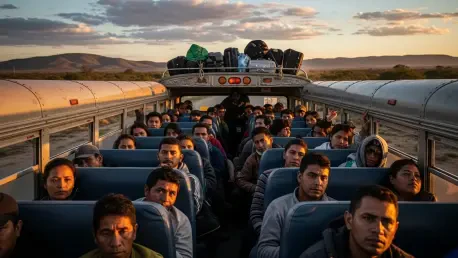Today, we’re speaking with Priya Jaiswal, a renowned expert in international business and market analysis with a deep understanding of cross-border labor dynamics and policy impacts. With her extensive background in finance and global trends, Priya offers unique insights into the complexities of international workforce issues, particularly in light of the recent immigration raid at a battery factory in Georgia involving South Korean workers. In this interview, we’ll explore the details of the incident, the diplomatic responses it provoked, the broader implications for U.S.-South Korea relations, and the intersection of immigration policy with economic development.
Can you walk us through the key details of the immigration raid that took place at the battery factory in Georgia?
I’m happy to provide an overview. Last week, a significant raid occurred at a battery factory under construction near Hyundai’s major auto plant west of Savannah. Over 475 workers were detained, with the majority—316—being South Korean nationals. Additionally, there were 10 Chinese, three Japanese, and one Indonesian worker among those held. From what has been reported, the raid was intense; video footage showed federal agents directing workers to line up outside, some being frisked and shackled with restraints around their hands, ankles, and waist, while others had plastic ties on their wrists as they were boarded onto buses. It painted a stark picture of enforcement action at a site tied to a major economic project.
What happened to the detained workers in the immediate aftermath of the raid?
After the raid, the workers were transported to an immigration detention center in Folkston, about 285 miles southeast of Atlanta. They were held there until arrangements were made for their release or departure. Most of them—over 300—were eventually bused from Folkston to Atlanta’s Hartsfield-Jackson International Airport, where they boarded a Korean Air charter plane back to South Korea. The journey itself was a point of contention, especially regarding how they were treated during transport, but the focus was on getting them home, with the flight departing shortly before noon on a Thursday and expected to land in South Korea the following afternoon.
How did the South Korean government react to this incident and the treatment of their citizens?
South Korea’s response was swift and vocal. President Lee Jae Myung publicly called for reforms to the U.S. visa system, expressing concern that such incidents could deter Korean companies from investing in the U.S. There were significant disagreements with U.S. officials over the handling of the detainees, particularly around the use of handcuffs during their bus transfer to Atlanta—something South Korean officials strongly opposed. Additionally, there was a debate over whether the workers’ departure would be classified as “voluntary departure” or deportation, which created further tension until a resolution was reached through diplomatic channels.
Can you elaborate on the diplomatic back-and-forth that influenced the outcome for these workers?
Certainly. The situation escalated to the point where high-level intervention was needed. There was a notable pause in the administrative process following instructions from the White House under the Trump administration. The directive was to allow the detainees the freedom to return home if they wished, or to stay if they preferred. South Korean officials were consulted on whether these workers should remain in the U.S. to continue their roles, which included training American workers, or be sent back. Ultimately, the U.S. offered a choice, and while most opted to return, one South Korean worker with family in the U.S. decided to stay. This flexibility was a direct result of diplomatic negotiations and highlighted the complexity of balancing enforcement with international relations.
What broader implications does this raid have for U.S.-South Korea economic ties, especially given the location of the incident?
This raid stands out because of its scale and location—a $7.6 billion Hyundai plant, which is Georgia’s largest economic development project and employs around 1,200 people. The targeting of a major manufacturing site tied to a key international partner like Hyundai raises questions about the impact on foreign investment. South Korea is a significant ally, and Georgia has nurtured a 40-year relationship with Korean businesses. The state government, through Governor Brian Kemp’s office, emphasized their commitment to maintaining strong ties despite this incident. However, the detention of South Korean nationals, who are not typically the focus of such enforcement actions, adds a layer of diplomatic sensitivity and could influence how Korean firms view future U.S. investments.
How does this incident fit into the larger context of U.S. immigration policy and workplace enforcement?
This raid is part of a broader wave of workplace enforcement actions under the Trump administration’s mass deportation agenda. What makes it unique is not just the number of detainees but the profile of those involved and the economic stakes. Typically, immigration raids target different demographics or smaller operations, so the focus on South Korean workers at a high-profile site like Hyundai’s plant signals a potential shift or at least a willingness to apply enforcement broadly, regardless of nationality or economic impact. It’s a reminder of how immigration policy intersects with global business, and the ripple effects can extend far beyond a single factory or community.
What is your forecast for the future of U.S.-South Korea relations in light of events like this raid?
Looking ahead, I think U.S.-South Korea relations will face some strain in the short term, particularly around investment confidence and labor policies. While both sides have expressed a desire to maintain their historically strong partnership, incidents like this could create hesitancy among Korean companies considering U.S. expansions. The call for visa system reforms from South Korea’s leadership is likely to keep this issue on the diplomatic agenda. However, if both governments can address these concerns collaboratively—perhaps through clearer visa guidelines or bilateral agreements on worker protections—I believe the relationship can weather this challenge. The key will be balancing enforcement priorities with the mutual economic benefits that have defined this alliance for decades.









